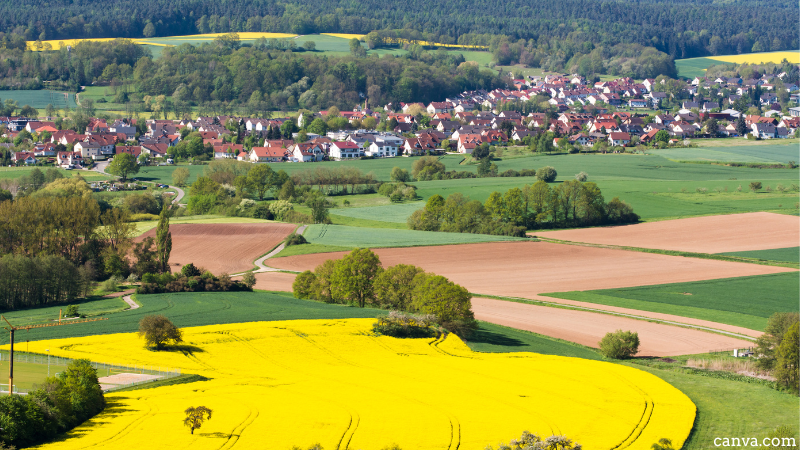
On January 1st 2023, the new funding period of the Common Agricultural Policy began. The EU member states, including Germany, have all developed National Strategic Plans to implement the new EU requirements. However, as the following article shows, this reform and its national implementation are not sufficient to achieve environmental, climate, animal wellfare and social objectives. The federal government is therefore called upon to make ambitious use of the opportunity for a first annual review of the Strategic Plan. Moreover, with a view on the reform post-2027, the government must advocate for a fundamental system change aimed at ensuring that EU funds are used exclusively for rewarding social, environmental, animal welfare and climate actions.
By Daniela Wannemacher and Phillip Brändle, translated and adapted by Mathieu Willard.
This article is an adaptation of an article written by the authors for the Agrar Bündis Critical Agricultural Report 2023.
A look back at the German Strategic Plan approval process
When Cem Özdemir became Minister of Agriculture in December 2021, the expectations of the associations of the german coalition “Agrar-Plattform” regarding progressive adjustments to the plan were high. On the to-do list, promoting organic farming, environmental and climate actions and a fair distribution of funds.
But the war in Ukraine gave weight to the voices speaking out in favor of relaxing the environmental standards of the CAP to intensify production. Derogations from current and future GAEC standards were put on the table.
At a conference of german agriculture ministers (AMK) on April 1, 2022, the agricultural impacts of the war, especially in relation to the CAP, were debated between the federal government and the Länder (States). In the run-up to the conference, the Agrar-Plattform called on the ministers in a joint statement not to give in to pressure from the agricultural and food industry, arguing that food security and environmental, climate and animal protection should not be opposed.
A few rectifications to the obvious weaknesses of the CAP Strategic Plan (CSP) were also proposed:
- New premiums for grazing cows
- Increased organic premiums in the second pillar
- Improved protection of biodiversity through all tools
- New subsidy for significant reduction of nutrient excesses
- Improved protection of wetlands through tillage restrictions
Moreover, the coalition proposed to supress the so called “Austrian Rule” that limits the budget allocated to eco-schemes to 23%, in order to boost it to 25%, adding 90 million euros annually for environmental, climate and animal protection. It was also proposed to increase both the reallocation to the Second Pillar and the budget for First Pillar eco-schemes over the course of the funding period.
At the same time, Germany received its observation letter, highlighting shortcomings on environmental ambition and distributive justice. From the point of view of the national chairman of the working group for rural agriculture (AbL), Martin Schulz, the observation letter was a great opportunity for the Ministry of Agriculture to make significant improvements to the CAP from 2023. However, the freshly elected Green Minister of Agriculture, Cem Özdemir, largely missed the opportunity for far-reaching improvements.
Even worse, Minister Özdemir, together with the federal states, subsequently gave in to pressure from the agricultural and food industry and softened the CAP in favour of “food security”. In Germany, for example, it was decided to make full use of the possibility granted by the EU Commission to suspend GAEC 7 (crop rotation) and GAEC 8 (non-productive areas), even though it had been repeatedly made clear by scientists that the expected effect on food production would be marginal.

Middle-sized farms, the big losers?
The missed opportunity for improving the german CAP has resulted in a Strategic Plan generating disparities between farm structures.
According to an Abl study[1], the evolution of subsidies at farm level carried out by scientific institutions, the administration and associations over the course of the year showed that medium-sized farms in particular will lose subsidies from the first pillar on a large scale compared to 2022, farms on grassland sites being particularly affected. The magnitude of the loss will depend on their ability to take part in eco-schemes to replace the greening payments of the previous funding period.
Small farms are more likely to make up for the loss of the greening payments through the increased redistributive payment. And large farms, especially in arable farming, will find it comparatively easier to compensate that loss. Significant gains in direct payments could be recorded due to the introduction of the coupled income support for livestock and the increase in the young farmer premium. However, this only applies to the latter if they have sufficient area to claim the full premium.

Will the system change come in 2028?
The approval process being completed, the debate is now focussing on the possibilities for adjustments within the current funding period (it is possible for the member states to further develop their strategic plans every year) and on the reform of the CAP post-2027.
With regards to the coming reform, the signs for a fundamental change in the system look good at first glance. According to the federal coalition’s agreement, the federal government wants to present a concept note on how direct payments can be appropriately replaced by rewarding climate and environmental services, as early as 2023. Existing reward systems based on points are also part of the election programs and positions of the SPD and Greens.
In June 2021, the Conference of Agriculture Ministers also welcomed the premium models of AbL and the German Association for Landscape Conservation (Deutschen Verband für Landschaftspflege) and decided to test them further. The Commission on the Future of Agriculture also recommended that CAP funds be “gradually and fully converted into payments that make concrete services in the sense of social goals economically attractive”.
Another factor that should not be underestimated is the pressure for change that will arise from 2023 due to the overwhelming complexity of the CAP. This is increasingly leading to the impression, not only in the agricultural world but also in administrations, that the CAP is a system that needs to be reformed and that a new start is necessary.
Despite those positive signs within Germany, it should not be forgotten that there are still strong forces, especially at European level, who want to stick to the existing system or even advocate a watering down of the existing greening measures.
The EU Commission also wants to present the first key points for the CAP post-2027 as early as 2023. It is to be feared that the Commission, referring to the consequences of the war in Ukraine, will focus more on further intensifying production. Furthermore, there is currently a very clear stance, particularly in the eastern member states of the EU, that area payments should be maintained. From the point of view of many associations of the Agrar-Plattform, it is therefore all the more important that Minister Özdemir clearly communicates and proactively advocates the exit from flat-rate area premiums in 2028.
We thus recommend the development, publication and pro-active representation of a concept note for the CAP post-2027 by the federal government, in which all funds are used for a fair and income-effective remuneration of services in the field of environmental action, climate and animal protection.

Taking advantage of the first annual review of the Strategic Plan
The debate around the CAP post-2027 must not result in the annual adjustment opportunities in the form of amendments to the German CAP Strategic Plan being left unused.
The need to enable further support for structurally and ecologically important grassland farms as quickly as possible and to actually make the funds of the basic payment available to the farms that need them the most is pressing.
Here below are our recommandations for amandements of the german CAP Strategic Plan that should be proposed for the first annual review:
- Increase the budget for organic schemes and agri-environmental and climate measures under the second pillar.
- Ensure sufficient funding for the expansion targets of organic farming.
- Introductuce a Germany-wide grazing premium for dairy cows.
- Introduce a reward system for balanced nutrient cycles and improvements in the protection of wetlands and biodiversity.
- Make use of the opportunity to co-finance the transition of animal husbandry to organic and extensive systems.
- Ensure a fair distribution of the funds of the basic payment according to actual needs, e.g. by significantly increasing the redistributive payment, introducing capping and degressivity, better adapt the eco-schemes according to the size of the field and/or farm.
A system change in 2027 must also take place in plannable steps for the agricultural holdings and must not lead to breaks. As early as October 2020, prominent members of the Greens with agricultural expertise, including Renate Künast, Robert Habeck, Martin Häusling, Harald Ebner, Friedrich Ostendorff and Anton Hofreiter, presented a paper that describes the “the stages of transformation of the Common Agricultural Policy (CAP)”. The Federal Ministry of Food and Agriculture (BMEL) should endorse this paper and adopt a bold and change-promoting stance.
[1] AbL: Auswirkungen der Reform der GAP nach 2023 auf die Prä- mienhöhen verschiedener Betriebstypen und Betriebsgröße – Kurzanalyse. Hamm/Berlin 2022
Download this article as a PDF
 This article is produced in cooperation with the
This article is produced in cooperation with the
Heinrich Böll Stiftung European Union.
More on CAP Strategic Plans
Can the CAP Strategic Plans Help in Reaching our Pesticide Reduction Goals?
Wallonia’s Observation Letter: A plan that fails to address climate and biodiversity crises
CAP Strategic Plans and Food Security: Fallow Lands, Feeds, and Transitioning the Livestock Industry
A Just and Green CAP and Trade Policy in and Beyond the EU – Part 2
A Just and Green CAP and Trade Policy in and Beyond the EU: Part 1
Bulgaria’s CAP Strategic Plan: Backsliding on Nature and Biodiversity
Changes “required” to Ireland’s CAP Strategic Plan – European Commission
French CAP Plan: What Opportunities for Change During the New 2022-27 Presidential Term?
CAP, Fairness and the Merits of a Unique Beneficiary Code – Matteo Metta on Ireland’s Draft Plan
ARC Launches New Report on CAP as Member States Submit Strategic Plans
Slashing Space for Nature? Ireland Backsliding on CAP basics
Quality Schemes – Who Benefits? Central America, Coffee and the EU
Civil Society Organisations Demand Open and Ambitious Approval of CAP Plans
CAP Strategic Plans: Germany Taking Steps in the Right Direction?
CAP Strategic Plans: Support to High-Nature-Value Farming in Bulgaria
Commission’s Recommendations to CAP Strategic Plans: Glitters or Gold?
German Environment Ministry Proposals For CAP Green Architecture
CAP Performance Monitoring and Evaluation Framework – EP Position
A Rural Proofed CAP post 2020? – Analysis of the European Parliament’s Position
CAP Beyond the EU: The Case of Honduran Banana Supply Chains
CAP | Parliament’s Political Groups Make Moves as Committee System Breaks Down
CAP & the Global South: National Strategic Plans – a Step Backwards?
CAP Strategic Plans on Climate, Environment – Ever Decreasing Circles
European Green Deal | Revving Up For CAP Reform, Or More Hot Air?
Climate and environmentally ambitious CAP Strategic Plans: Based on what exactly?
How Transparent and Inclusive is the Design Process of the National CAP Strategic Plans?





